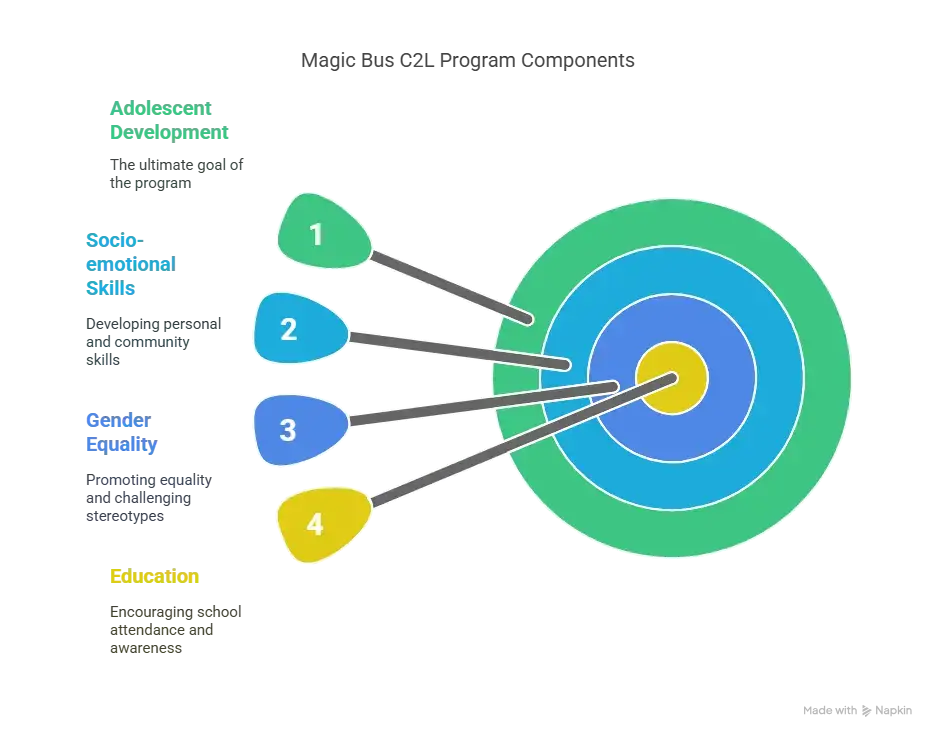GANDHINAGAR– A comprehensive new study, published in the journal BMC Public Health, has provided compelling evidence that life skills education can significantly enhance both the educational outcomes and socio-emotional development of adolescents.
Titled “The impact of life skills education on socio-emotional development and school-related outcomes among adolescents in India,” the research evaluates the effectiveness of the Magic Bus India Foundation (MBIF) Life Skills program, also known as the Childhood to Livelihood (C2L) program.
The study by Anirudh Tagat of the Department of Economics, Monk Prayogshala and School of Mathematics, Monash University; Akshaya Balaji of Monk Prayogshala; and Hansika Kapoor of the Department of Psychology, Monk Prayogshala and Neag School of Education, University of Connecticut, offers crucial insights for policymakers aiming to integrate socio-emotional learning (SEL) into school curricula, particularly in resource-constrained regions.
The short-term analysis involved a sample of 1,898 children from five projects with a “pre-post” sampling design. For the long-term analysis, a larger sample of 5,582 children from a single large-scale project (conducted between 2015 and 2018) was utilized.
The Crucial Role of Socio-Emotional Skills in Adolescent Development
Socio-emotional skills are increasingly recognized as vital complements to intellectual abilities, empowering children with the tools to navigate life’s challenges, foster healthy relationships, manage stress, resolve conflicts, and build confidence.
Experts emphasize that SEL is fundamental for overall success in academic and professional life, aligning with extensive systematic reviews on the interplay between personality traits and economic outcomes. Previous literature suggests that cultivating these skills is crucial for human capital development, impacting educational attainment and health-related behaviors.
The relevance of SEL has been further amplified by the COVID-19 pandemic, which led to large-scale school closures and significant learning losses, particularly affecting marginalized children. India, home to one of the world’s largest adolescent populations, has experienced substantial learning setbacks post-pandemic, making targeted SEL interventions exceptionally pertinent.
In India, there has been a growing emphasis on developing SEL, particularly for girls and in challenging traditional gender norms around education. Prior studies in the country have shown that life skills sessions can boost women’s agency, bridge gender inequality perceptions, and improve schooling attainment, including a 30% reduction in dropout rates among adolescent girls.
Other research indicates that SEL can lower test anxiety among students and lead to better academic achievement. The current study specifically examines the impacts of the C2L program on school-related outcomes and the development of key socio-emotional skills like egalitarian gender attitudes, resilience, and perceived self-efficacy.
The Magic Bus C2L Program: A Deep Dive
The Magic Bus India Foundation’s C2L program targets adolescents aged 11 to 15 years and runs for a duration of three years. Its core components are meticulously structured to address three critical areas:
- Education: This includes promoting school regularity (attending 5 or more days a week), making children aware of their Right to Education (RTE) and associated facilities, encouraging class participation, and emphasizing the benefits of staying in school.
- Gender: The program aims to foster equality and equity perceptions across various domains and challenge cultural stereotypes.
- Socio-emotional skills: Key focuses include developing self-efficacy, resilience (including problem-solving abilities), and shaping community perceptions.

The program’s implementation primarily relies on Community Youth Leaders (CYLs), who are volunteers from the local communities. These CYLs serve as mentors, conducting weekly activity-based sessions that cover schooling, gender, and socio-emotional skills. While specific timing and duration details for these sessions are not available, CYLs are instructed to hold them during break times or after school hours. It’s important to note that this study did not cover additional components of the C2L program related to workplace readiness and employability skills, as data on these outcomes were still being collated.
Rigorous Methodology Employed Across Multiple Sites
The research utilized a robust pre-post cohort research design across five study sites, collecting data at three critical intervals:
- Baseline: At the program’s inception.
- Midline: Approximately 18 months into the program, used for short-term analysis.
- Endline: Approximately three years into the program, upon completion, used for long-term analysis.

Data were collected using computer-assisted personal interviewing (CAPI) methods in local languages, with questionnaires carefully translated to ensure semantic, conceptual, and normative equivalence. The short-term analysis involved a sample of 1,898 children from five projects with a “pre-post” sampling design. For the long-term analysis, a larger sample of 5,582 children from a single large-scale project (conducted between 2015 and 2018) was utilized. This long-term study employed a child-level randomized design, including both treatment and control groups, which allowed for a more direct comparison of program impacts, overcoming some limitations of the pre-post approach. The age range for the long-term sample was slightly wider, from 10 to 17 years.
The empirical strategy involved panel data analysis using multiple linear regression models to evaluate the program’s effects on key outcomes such as school attendance, self-efficacy, resilience, and gender attitudes. For the short-term studies, a panel multiple linear regression framework was used to estimate effects, while for the long-term data, difference-in-differences (DiD) methods were applied, comparing outcomes between treatment and control groups over time. The study also conducted sub-group analyses to understand how impacts varied by age and gender.
Unveiling the Short-Term Successes (18 Months)
The short-term analysis, based on baseline and midline data, revealed significant positive associations and impacts of the C2L program.
- School Attendance: While the direct program effect on regular school attendance was not statistically significant across all groups in the short-term, a notable finding emerged: a girl who participated in the life skills intervention had a 55% increase in the odds of regularly attending school. This is particularly encouraging given that at baseline, being a girl child was associated with lower odds of regular school attendance. This finding aligns with other studies showing a reduction in dropout rates among adolescent girls following life-skills interventions.
- Aspirations: The program showed a robust, statistically significant, and positive association with increased aspiration to study, leading to a three-fold increase in the odds of studying till graduation.
- Awareness of RTE: There were very large and statistically significant impacts on awareness of the Right to Education (RTE) program following the intervention.
- Socio-emotional Skills: The program had a positive and statistically significant impact on improved and egalitarian gender attitudes (by approximately 0.6 points) and perceived self-efficacy (by approximately 4 points). The strongest gains in gender attitudes were observed in older children (over 13 years), while improvements in perceived self-efficacy were concentrated among the youngest participants. Girls, in particular, developed more egalitarian gender attitudes, with an average 1.5 unit increase in their gender attitudes score after the program, consistent with findings from other programs.
The study also highlighted the strong links between socio-emotional skills and school-related outcomes in the short term:
- Egalitarian gender attitudes were associated with a 3.9% increase in the odds of aspiring to study further, a 4.4% increase in regular school attendance, and a 5.5% increase in RTE awareness.
- Higher self-efficacy scores were linked to a 7.8% increase in the odds of regularly attending school and a 2% increase in RTE awareness. This corroborates other research establishing a strong relationship between self-efficacy and educational aspirations among adolescent girls.
- Higher resilience scores increased the odds of aspiring to study further by 5% but were associated with a 4.3% reduction in the odds of regularly attending school. This counter-intuitive finding regarding resilience and attendance suggests complex pathways that require further understanding.
Significant Long-Term Gains (3 Years)
The long-term analysis, utilizing baseline and endline data with treatment and control groups, revealed sustained and substantial impacts.
- Socio-emotional Skills: The program showed a strong and positive statistically significant impact on all three key life skills parameters at the endline:
- Perceived self-efficacy: An average increase of 2.5 points.
- Resilience: An average increase of 1.1 points.
- Gender attitudes: An average improvement of 0.45 points.
- School-Related Outcomes:
- Regular school attendance: A significant increase in the odds of 66.5% points. The long-term program effect was particularly strong for girls, who more than doubled their odds of regularly attending school.
- Aspirations to study further: An increase of 27.1% points in the odds.
- Studying until graduation: Participants showed a three-fold increase in the odds of studying until graduation, along with heightened awareness of the Right to Education (RTE) program.
Similar to the short-term findings, the long-term results reinforced the strong positive association between socio-emotional skills and educational outcomes:
- More egalitarian gender attitudes were associated with a nearly 87.4% point increase in the odds of attending school regularly and a 15% point increase in the odds of aspiring to study further.
- An increase in resilience scores was linked to a nearly 50% increase in the odds of regularly attending school but also a sharp reduction in aspirations to study further. This reiterates the complex role of resilience.
- An increase in perceived self-efficacy scores was associated with a 47% point increase in the odds of wanting to study further, though not significantly with regularly attending school in the long-term model. These findings align with international programs like the UK’s Social and Emotional Aspects of Learning (SEAL) program, which also reported increased attendance.
Policy Implications and Future Directions
The study’s concludes with a positive impact of the C2L program on both educational and socio-emotional outcomes among adolescents. The findings strongly suggest that life skills interventions can effectively boost school attendance, self-efficacy, resilience, and gender attitudes.
This research holds significant implications for education policy, especially in India, given the implementation of the new National Education Policy (NEP) in 2020, which champions a more holistic approach to education with a focus on developing life skills. The study highlights that SEL development is intimately linked with critical policy outcomes like school attendance, particularly among girls.


